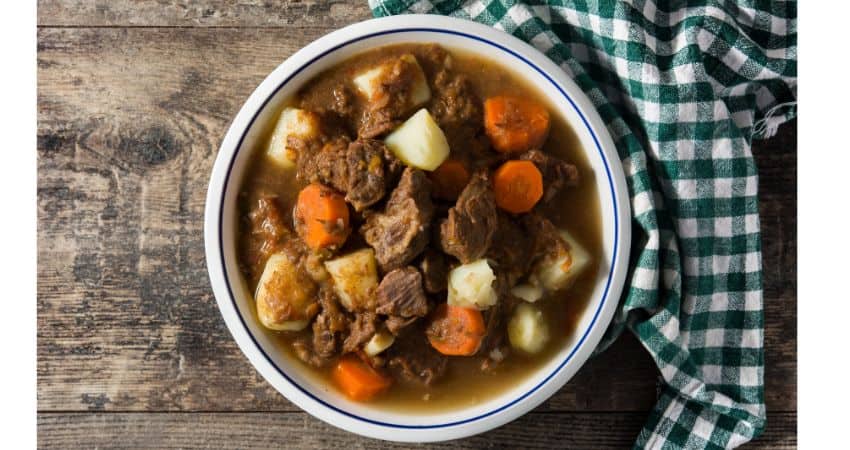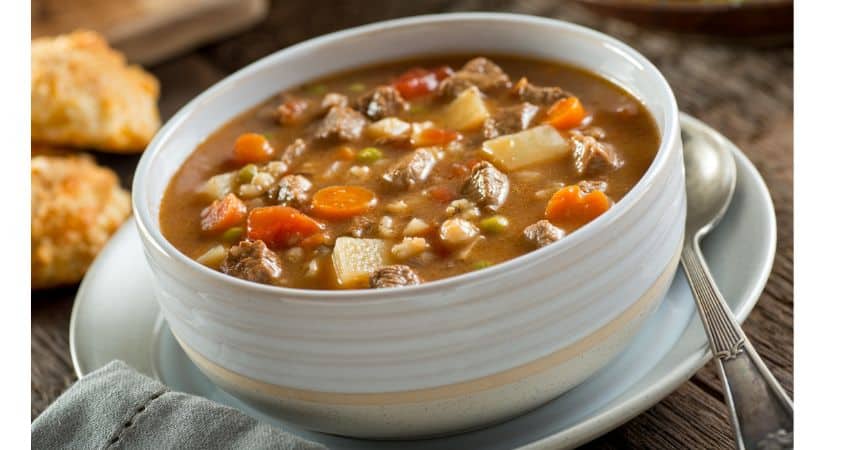Can Beef Stew With Potatoes Be Frozen?
Let’s take a close look and determine if beef stew with potatoes be frozen.
Beef stew with potatoes can’t be frozen. The potatoes will fall apart and give the entire stew a grainy consistency. If you are freezing beef stew, leave out the potatoes or leave them severely undercooked.
You can still have potatoes in your beef stew, but you will need to get a little more creative about adding them in or removing them before you are ready to freeze the stew.
This article will give you a few alternatives to grainy, mushy, disintegrating potatoes, so let’s dig in.

How To Freeze Beef Stew With Potatoes
Most experts agree you shouldn’t attempt to freeze potatoes in your beef stew or any other type of soup or stew. Instead, you might want to cook your beef stew without potatoes if you’re planning to freeze it before serving.
You can add the potatoes when you’re ready to serve them, as they will have a better texture1.
As a general rule, perishable foods, like beef stew , should be eaten or froze within four days2.
Disclaimer: Some of the links in this article are affiliate links which means I may earn a small commission at no extra cost to you. As an Amazon associate I earn from qualifying purchases.
Be sure to use a good quality food storage container to handle the freezer and weight of the stew. Amazon has a nice variety at affordable prices along with labeling for dates. Check them out here, food storage containers.
Mushy, Grainy and Disintegrating Potatoes
Avoid adding potatoes to any soup you plan on freezing. Cooked potatoes don’t hold up well when frozen, especially if they’re part of some more complex recipe. They may include soups, stews, casseroles or other full meals.
The potatoes generally look fine as long as they remain frozen. However, when it’s time to thaw the soup and heat it, they start to fall apart.
They become mushy and fall to pieces in the stew, leaving it full of a grainy, unappetizing mush. For that reason, it’s better if you leave the potatoes out of your stew.
If You Must Add Them, Leave Them Undercooked
However, if you absolutely insist on adding potatoes into your beef stew before freezing it, there is a way to do it. It’s still not highly recommended you do so, but if you feel you must add them, you can severely undercook them.
In fact, you may want to undercook most of the vegetables you plan on adding to the stew.
If you cook the vegetables in your stew thoroughly, they’ll be overcooked when you thaw it out and reheat it. Instead, fully cook everything for the stew aside from the vegetables. Then, when you freeze it, your vegetables are only half cooked, while everything else is fully cooked and edible.
While you’re warming the stew after thawing, the vegetables will continue cooking and should be ready to eat by the time the stew is heated.
If you plan to eat some of the stew now and freeze the rest for later, remove the portion you plan to freeze about halfway through the cooking process. Then you can continue cooking what you’ll be eating immediately, and the frozen portion will finish cooking later when you decide to reheat it.
How To Add Potatoes to Thawed Beef Stew
The best option for freezing beef stew is to cook and freeze it without potatoes. If you want them in the stew, cook them separately and add them only to the portion you’re eating immediately. When it comes time to freeze the rest, there won’t be any potatoes for you to worry about freezing.
Later, when you decide to reheat it, you can cook your potatoes separately and add them in fresh to the reheated stew. It doesn’t take extra time, and saves you from the disappointment of having to choke down a gummy, gooey stew.
If you want your potatoes to have the same flavor as your stew try this. When you add them while cooking, you might want to cook them in the same broth you used with the stew. Season the potatoes after cooking, before putting them in the stew.

Removing Potatoes Before Freezing
Another option is to spoon out the potato chunks from your stew before freezing it. Although this method is not recommended, as it’s time-consuming, messy, and there’s no guarantee you’ll get all the potatoes out of the stew.
Even if the potato chunks in your beef stew are large and easy to see, there’s a possibility you’ll miss a few. Those few could be enough to fall apart and gum up the whole stew later.
If you really enjoy potatoes in your stew and have the time to go through with a spoon or strainer, then remove them all before freezing the leftovers.
Your best bet is still to cook your potatoes separately and add them in each time you eat the stew. Most people prefer the undercooking method to this one.
How Long Will Frozen Beef Stew Last?
Opinions are divided over how long frozen beef stew will remain fresh and safe to eat. According to Betty Crocker’s guide to making and storing stew, it’s best if eaten within three months of the original freeze date. However, frozen food, when sealed properly, can last up to a year without any loss of quality.
Stew can be frozen for up to 12 months although it tastes better if eaten in three months.
Some experts say it should be safe to eat in a pinch for even longer than 12 months, but you’re going to lose a lot of quality after that. I don’t recommend keeping it after that long3.
Can You Refreeze Frozen Stew That Has Been Thawed?
Frozen stew that has been thawed should not be refrozen for the following reasons:
- Refreezing can increase food’s exposure to bacteria and increase the risk of becoming ill.
- Each time frozen food is thawed, it gets mushy. Refrozen food will be even mushier the next time it’s thawed.
- The taste and quality of food decrease with each freeze and thaw cycle.
Of all the foods you can refreeze, soups and stews are most likely to turn out okay. Still, it’s better not to freeze and thaw food more than once.
If you’re concerned you have too much stew to eat in a single reheat session, separate the leftovers into smaller portions using separate containers.
If you have any questions about this article don’t hesitate to comment below or email us. You can find an email on our contact page.
Read Next – More Food Storage Articles For You!
This Is How To Properly Store Tomatoes
Should Carrots Be Stored In Water?
- Betty Crocker: How To Cook, Store and Reheat Stew [↩]
- Institute of Agriculture and Natural Resources: Freezing Cooked Food for Future Meals: Freezer Bag Tips [↩]
- FDA: Refrigerator & Freezer Storage Chart [↩]
